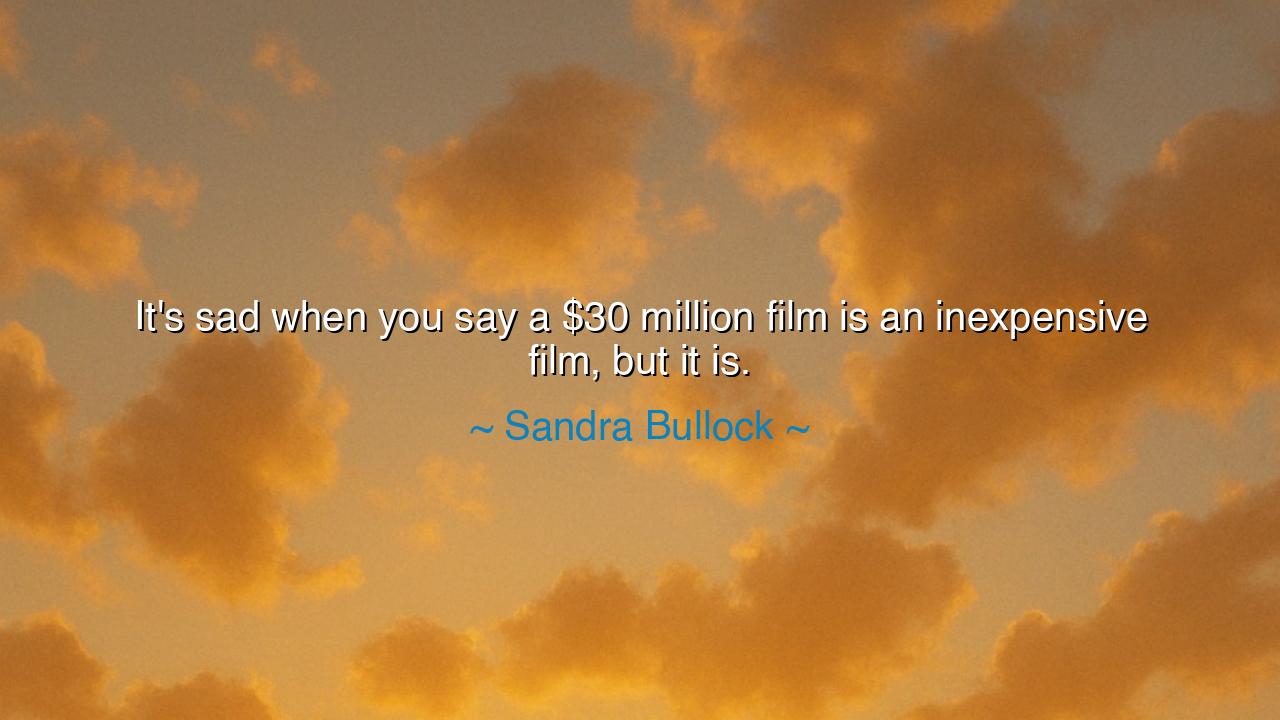
It's sad when you say a $30 million film is an inexpensive film






Hear now the words of Sandra Bullock, who unveiled a truth about the world of storytelling and spectacle: “It’s sad when you say a $30 million film is an inexpensive film, but it is.” What may sound like wealth beyond imagining to most, in her world has become a modest sum. These words carry more than commentary on money—they reveal how human desire, scale, and ambition transform what once seemed abundant into something small. They remind us of how values shift when measured not by necessity, but by excess.
From the earliest times, people have struggled with the notion of worth. Gold that could feed a village for a year was worn on the arm of a king as ornament. Grain that might save lives was poured into the fires of offerings. Sandra’s reflection belongs to this ancient truth: what is precious to one may be deemed ordinary in another realm. The film industry, with its sprawling budgets, mirrors the empires of old, where resources flowed in torrents not to feed hunger but to fuel grandeur.
Consider the building of the Pyramids of Giza. To a single laborer, a loaf of bread was treasure; to the pharaoh, thousands of loaves were consumed each day to sustain a workforce of tens of thousands. What was unimaginable wealth to the commoner was but the cost of construction to the ruler. So too, in Bullock’s world, what would appear as fortune to ordinary souls is but the cost of telling a story on screen. This shift in perspective is both wondrous and sorrowful, for it reveals the gulf between the common life and the empire of spectacle.
Sandra’s words also lament the inflation of value in art and commerce. For $30 million, one might build schools, hospitals, or homes for the homeless, and yet in the halls of Hollywood, it becomes the “inexpensive” price of a tale told in flickering light. This is not merely a reflection on numbers, but a cry about perspective—how quickly the human heart can grow numb to the scale of abundance when it becomes familiar. The sorrow lies not in the art itself, but in the blindness that forgets how great a sum truly is.
Yet her reflection also points to the nature of art as ambition. Great films, like great temples, require sacrifice, coordination, and resources beyond the reach of one soul. When people gather to tell a story that can touch millions, their canvas is vast, and the price reflects the dream. The paradox is this: what seems “sad” in cost may also be noble in purpose, for human beings have always poured wealth into what gives meaning—into songs, into monuments, into tales that will outlast them.
The lesson, children of time, is thus: measure wealth not only by numbers, but by perspective. Do not forget that what is called small in one place is immense in another. Guard your heart against numbness, and always remember the true value of resources. To the poor, a meal may mean life; to the rich, a fortune may seem mere dust. The wisdom lies in never losing sight of how far that wealth could go outside the walls of grandeur.
In practical terms, let us cultivate gratitude. When you see abundance, do not call it small, but honor its true worth. If you labor in a world where sums are vast, remember those who live where sums are scarce. Let your own works, whether in art or in daily life, balance ambition with humility. For the danger lies not in dreaming big, but in forgetting the true weight of what you hold in your hands.
Thus, Sandra Bullock’s words stand not as complaint, but as a mirror. They show us how scale distorts perception, how abundance can make us blind, and how essential it is to stay awake to true value. May we all remember: riches may swell or shrink depending on where we stand, but wisdom is found in never losing sight of what such wealth could mean for those who have none.






AAdministratorAdministrator
Welcome, honored guests. Please leave a comment, we will respond soon